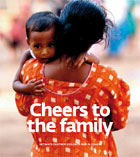Publication on intimate partner violence and alcohol
Cheers to the family
No society is immune from intimate partner violence. Alcohol plays a significant role in those tragic events, breeding violence from the combination of intoxication with ill-conceived images of masculinity and repressive social norms.
Studies from around the world reveal that intimate partner violence and alcohol proves to be a part of the problem in very many cases. This complex problem must be addressed from numerous perspectives. Working together we can eliminate family violence. This is the starting point of the new publication “Cheers to the Family”, addressing intimate partner violence and alcohol.
The publication is produced by The International Institute of IOGT-NTO, Sweden and FORUT Norway in cooperation with IOGT International. The purpose of the new booklet is to provide an introduction to a topic which is often ignored in development strategies, namely the role of alcohol in the spread of violence and HIV/AIDS.
The booklet “Cheers to the family” can be downloaded in a low resolution version here.
Hardcopies of the booklet can be ordered from add@forut.no
Many development agencies experience alcohol drinking as a risk factor in their project populations, but this fact is often not reflected in the design of programs and interventions. The idea behind “Cheers to the Family” is not to replace existing approaches and strategies. However, these strategies may be even more effective if the role of alcohol is acknowledged and if alcohol prevention is made part of violence and HIV/AIDS prevention. Prevailing images of masculinity is obviously one factor linking these problems together.
The introduction to the booklet – Men, Masculinities and the Bottle – is written by Gary Barker, Director of Gender, Violence and Rights at the International Center for Research on Women in Washington D.C. He concludes by saying that “the solutions are not easy. Control of alcohol sales (both hours and places) and public education have shown some evidence of making a difference. In addition to these, nothing beats a good conversation, talking to boys and men, gently and frequently – explaining that manhood does not have to be stoic, drunken and reckless, telling them, in other words, that drinking excessively does not make you a man.” Gary Barker is also the co-chair of MenEngage Alliance.
Other parts of the booklet introduces the international evidence base on alcohol as a risk factor to violence with references to the research book “Alcohol; No Ordinary Commodity” (Thomas Babor et al). An interview with the Norwegian alcohol researcher Ingeborg Rossow provides more details on how drinking triggers violence. The booklet also briefly presents the evidence base on which are the most effective interventions to prevent alcohol-related harm, namely restrictions on the consumers’ access to alcohol by using limited sales hours, age limits, taxation, reduced numbers of outlets etc.
RELATED ARTICLES
- New report highlights benefits of policy measures to prevent harmful alcohol consumption
- Highlighting the COVID-19 – alcohol connection
- Alcohol among risk factors increasing
- WHO Launches Global status report on alcohol and health 2018
- Effective alcohol policies are needed now to yield health benefits in the future
- Intervention gives reduced drinking, aggression and violence
- Alcohol as an obstacle to development
- Empowerment of children is key in drug prevention
- Powerful reminders of the many real effects of alcohol consumption
- Alcohol use a significant cancer risk factor

